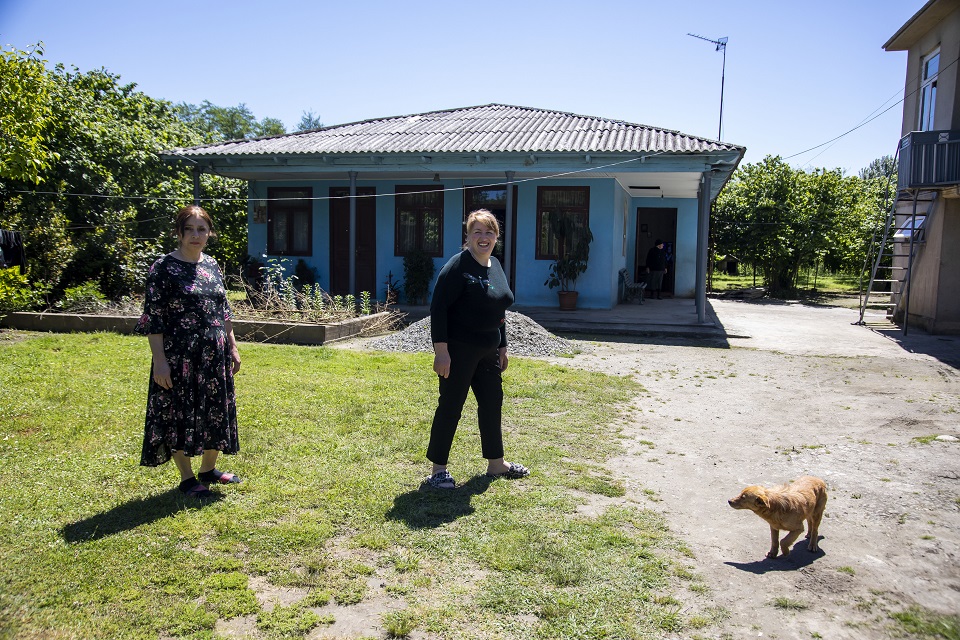The Farmer Field School training platform for women’s entrepreneurial development
Date:

Irma Khubua and Lamzira Malichava get together every morning at seven o’clock to milk their cows. Their husbands are brothers, so only a single fence separates the women’s houses in the village of Koki, located in the Zugdidi municipality. In addition to kinship and friendship, Irma and Lamzira are also connected by business: they both produce dairy products and cheese for local sale, including Georgian sulguni (a brined cheese), matsoni (traditional yoghurt) and nadughi (a type of regional pot cheese).
Each morning, after greeting each other, they first wash their cattle and then start to milk the livestock. Irma has three cows and Lamzira six, so the whole process takes them around an hour. They then take the fresh milk back to their homes, strain it and leave it for a while. Meanwhile, comes time for coffee. This is an unwavering tradition for these two women: they must drink the day’s first coffee together and exchange news. Once they are done catching up, arrives the time to make fresh cheese. After they have put away their freshly made cheese, they get ready for work.
Irma, a 51-year-old primary school teacher by profession, is the manager of the kindergarten in Koki. She has two children and three grandchildren. While the 47-year-old Lamzira, who is a trained pharmacist, works as a coordinator for the provision of material and technical assets for a rural school, and who is raising three children of her own. Both women are also involved in civic activism: back in 2010, when Taso Foundation launched a community mobilization initiative in Koki with the support of UN Women, Irma and Lamzira were among the first people to form a self-help group and they soon made positive changes in their community. And since 2021, they have been participating in the Farmer Field School training platform, through which, along with the preparation of new types of cheese, they also learn entrepreneurship.
The Farmer Field School is part of a joint project between UN Women and the UN Food and Agriculture Organization, entitled “Promoting the Economic Empowerment of Women Farmers by Supporting Dairy Production through Farmer Field School (FFS) Approaches”. It operates in the region of Samegrelo-Zemo Svaneti and it serves to establish a network of female farmers, under which training is conducted to strengthen and develop their respective farming skills.
With the help of the platform, women farmers, including Irma and Lamzira, learn international food and nutritional safety standards, as well as modern cheese production technologies; including how to make Italian caciotta and grilled cheese. They also attend an entrepreneurial businesses course at the Academy of the Georgian Ministry of Finance, and thus deepen their entrepreneurship, leadership and management skills. While, from another perspective, the UN Women component of the initiative also envisages raising awareness in terms of women’s rights and domestic violence.
Irma and Lamzira were both fascinated by the idea of the Farmer Field School from the very beginning. Lamzira took the initiative to gather other participants and then united local women, this time to gain fresh knowledge. “Besides types of cheese, the Farmer Field School also taught us a lot about business,” Lamzira notes. “In particular, I would highlight the information obtained from preliminary market research and target groups.”
Irma adds: “There were so many details when preparing Italian caciotta that I thought, ‘Look at everything you have to do in order to prepare it!’ I especially liked the grilled cheese. It takes more time than sulguni, but it is very interesting.”
For years, this pair have been working on activating and empowering women, so they value entrepreneurship from this perspective as well. “Having your own business does not mean that you only have a source of financial income,” says Lamzira. “You also become more confident and independent, so entrepreneurship is of great importance for women.”
The women now want to put into practice what they have learned at the Farmer Field School, so now the subjects of their morning discussions regularly concern the future of farming; they consider how to develop their business to such an extent as to introduce cheeses produced with modern technology and to offer more diverse choices to their customers. UN Women will therefore help them market their products and connect them with distributors.
In addition to Irma and Lamzira, there are nine other women in the Farmer Field School in Koki village. Under the framework of this project, 20 additional field schools will be created across eight municipalities, where 1,000 farmers will be retrained. The project ¬– “Promoting the Economic Empowerment of Women Farmers by Supporting Dairy Production through Farmer Field School (FFS) Approaches” – has been implemented with the financial support of the Swiss Agency for Development and Cooperation.